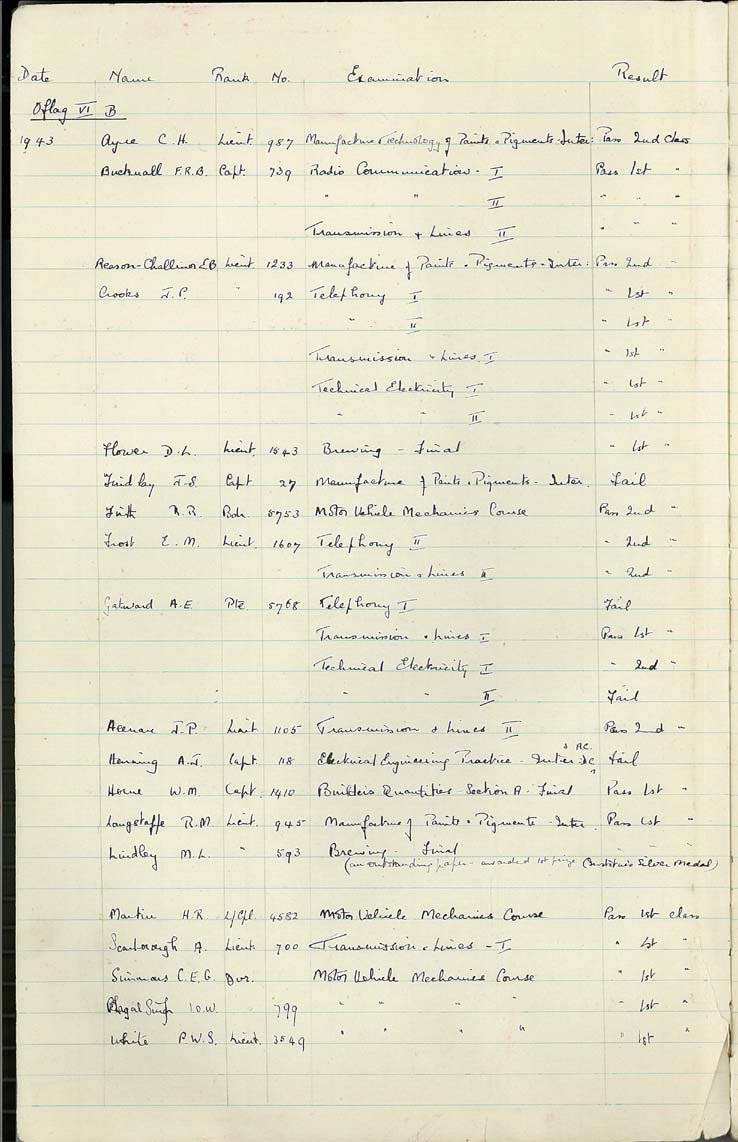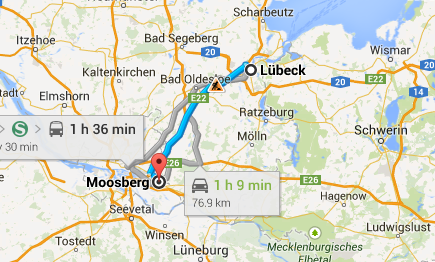Millennium Project
Deddington Beeches Bowl's Club accounts and minutes 1964 to 1984 were contained in a foolscap sized hard bound ledger. Also contained in the ledger were the names of a large number of Prisoners of War (POWs) in World War Two (WWII) - click on the image for a larger version of the first page of names.
Why these names should be in the ledger became an interesting mystery to resolve. Like all good detective stories it did not unfold quickly or easily but does have a happy ending.
 Geoff Todd starts the story...
Geoff Todd starts the story...
"I moved to Deddington in 1983 and the following Spring discovered there was a bowls club in the village. Having played bowls on and off during the previous fifteen years, I was soon persuaded to join Deddington Beeches Bowls Club, then situated in Earls Lane (now The Beeches). It was not long before I became Club Treasurer. In 1985 I adopted a different system of book-keeping and discontinued using the stiff covered foolscap book that had been in use since 1964. However, because it contained references to servicemen who had gained qualifications while apparently interned in Prisoner of War Camps in Germany - including the renowned Stalag Luft III (The Great Escape story), I retained it against the day when we could find out who the men were.
In 2009 I met Michael Allbrook, then a newcomer to the village, who told me he was researching the names on the village war memorial. I mentioned to Michael that I had this book containing references to the war which Michael borrowed to aid his researches."
Rob Forsyth takes up the story..."My contribution to Michael's project was to research those who had served in WWII so he gave me copies of the pages at the front of the Bowls Club ledger on which were handwritten the names, ranks, numbers, names of the educational course in which examined and the results of the exam for some 95 soldiers and airmen. It transpired that the names were not of Deddington men and so I set my notes aside to look into again once the Parish at War project was complete. In 2011 we published the book; in 2012 a supplement was published and in 2013 a new War Memorial Plaque was dedicated in the church - all of which kept us very occupied.
it was not until 2014 that I re-discovered my notes at the bottom of my 'to do' basket. I re-checked the names and confirmed that, to the best of my knowledge, none were Deddington men. I happened to know John Drummond (ex RN submariner like myself) who is a voluntary researcher at The Soldiers of Oxfordshire Museum (SOFO)1 in Woodstock. I sent him copies of the first page (as above) which contained the names of soldiers interned in Oflag VIB and asked if he could find out if these were perhaps from Oxfordshire and Buckinghamshire Regiments; I thought this might thereby identify the owner of the ledger as a local person. John's research showed that the names were not from any Ox & Bucks Regiments - see his annotated list HERE - and he suggested I brought the book to in to the museum for John Sheldon, their POW specialist, to take a closer look at it.
John Sheldon explains ... "On first opening the ledger I found, hidden amongst many blank pages, another eight pages containing some 200 more names.The fact that all the entries were in the same handwriting, in alphabetical order under five different camp headings and all listed their respective educational qualifications achieved whilst a POW, indicated that this was a fair hand copy of information received from the ex prisoners post war of the educational courses they had taken whilst in their respective prison camps."
(Click on links to see names for each camp - Oflag VIB Stalag Luft III Stalag Luft VIIIB Stalag Luft III East Stalag Luft III Nord)
"At the end of the war all POWs were processed through holding camps in which, as well as being fed, clothed and medically treated, they were individually debriefed on their activities in camp. I suggested that the Bowls Club ledger had been compiled by one person in camp administration who either came from Deddington, or had come to live there, post war and that he had retained the book because such a useful sized source of paper was hard to come by in 1945/46. 19 years later, knowing the Bowls Club needed a book to keep their accounts and minutes in, he offered the ledger for this purpose. The POW camps in the ledger were all in the east near the Polish border and the area near Lubeck was where many of the Long March survivors first arrived on return to the west and freedom. Holding camps for the returning POWs were established and the largest was Moosberg. I suggested that we were looking for someone who had served in a regiment in this area in 1945."
Rob Forsyth resumes ... I had established some time ago with Brian Fuller that the hand writing of the POW lists was not the same as that of his father, Charlie, who was the Treasurer in 1964 - as shown by the list of club members and officers on the opening pages of the Bowls Club entries - and anyway Charlie had not served in the forces because he was a farmer. I also now knew from my WWII researches for A Parish at War that none of the club members listed in 1964 were serving anywhere near Moosberg at war end ...with one possible exception! I did not know anything about The Hon AE Cubitt. His is the very first name in the list of club members. This gentleman, in return for the privilege of paying five £5-5-0d (old money) subscription - everyone else generally paid £1-1-0d - was President of the club and remained so until he died in 1972 which was 5 years before I and my family moved to Deddington.
The Hon Archibald Edward Cubitt (1901-72) had not figured in my researches because he was not Deddington born and the family had faded in memory after they left the parish following his death. However, as soon as I started to inquire around, memories were prompted. I gathered that he and his family had lived in what was then called The Cottage on Chapmans Lane (now Holmwood). He was known to be well connected (very! - he was the second son of the 2nd Baron Ashcombe2) and served on the bench as a JP and ...
More importantly... he had served in WWII as a Major, 98th (Surrey and Sussex Yeomanry) Field Brigade, Royal Artillery and....
 ... in 1945 the 98th had been stationed in Lubeck with the specific duties of Occupying Force administration. As John Sheldon had pointed out, Lubeck and Moosberg are relatively close to each other - although travel by road might not have been so fast in 1945! - so came under the 98th's jurisdiction.
... in 1945 the 98th had been stationed in Lubeck with the specific duties of Occupying Force administration. As John Sheldon had pointed out, Lubeck and Moosberg are relatively close to each other - although travel by road might not have been so fast in 1945! - so came under the 98th's jurisdiction.
In Conclusion ... it is almost certain that the Hon Archibald Cubitt JP is the person who possessed the ledger and gave it to the Deddington Beeches Bowls Club. The exact circumstances in which the ledger was acquired by him are still to be established but one can speculate that he was the officer in charge one of the units debriefing POWs.
 At this point I closed the book and would have liked to say "Job well done" but...written inside the back cover are these words. I had assumed it was a note of someone's name - possibly a German - in charge of a camp. However, whilst writing up this article, I decided to search 'Vittel' on the internet and l and found that Vittel was the name of a civilian prison camp during World War II. Hundreds of American and British families were interned there from September 1942 until liberation by the US Army on September 10th, 1944. Is there another story as to why it is written in the Bowls Club Ledger! I was also interested to find out that at least five of the officers in Stalag Luft III, and possibly ten, were Royal Naval Fleet Air Arm pilots (click HERE for names); apparently the Germans treated them as RAF pilots - which would not have gone down well with the fiercely tribal FAA!
At this point I closed the book and would have liked to say "Job well done" but...written inside the back cover are these words. I had assumed it was a note of someone's name - possibly a German - in charge of a camp. However, whilst writing up this article, I decided to search 'Vittel' on the internet and l and found that Vittel was the name of a civilian prison camp during World War II. Hundreds of American and British families were interned there from September 1942 until liberation by the US Army on September 10th, 1944. Is there another story as to why it is written in the Bowls Club Ledger! I was also interested to find out that at least five of the officers in Stalag Luft III, and possibly ten, were Royal Naval Fleet Air Arm pilots (click HERE for names); apparently the Germans treated them as RAF pilots - which would not have gone down well with the fiercely tribal FAA!
So Watch this space. I am sure there is more to come...!
Footnotes
1 In fact the word 'Soldiers' in the SOFO's title means soldiers in the broader meaning of the word and the museum encompasses records about all the armed forces in Oxfordshire; albeit the Army is the largest proportion at present. The museum would very much like to hear from any ex RN or RAF service people willing to assist in research to balance the records. The SOFO museum is located in the grounds of the Oxford Museum and its website with full details can be found HERE.
2 More details about The Hon. Archibald Cubitt, his family and his grave in St Mary & St Nicholas churchyard, Chetwode, Aylesbury can be found HERE (courtesy of www.findagrave.com) and of his cousin Baron Ashcombe HERE (courtesy of a Daily Telegraph obituary). The present 5th Baron Ashcombe (2014) is Archibald's grandson as the 4th Baron had no male heir.